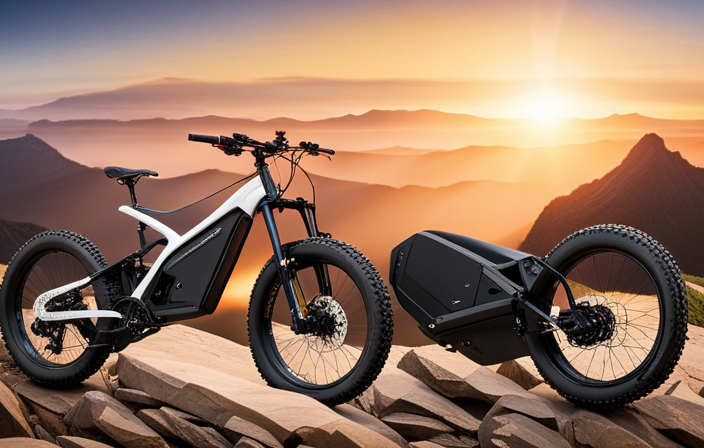Imagine you’re in need of a new electric bike battery. You may be wondering, ‘How much will it cost me?’
Well, the answer isn’t as straightforward as you might think. The price of electric bike batteries can vary based on several factors, such as the type of battery, its capacity, and the brand.
In this article, we will delve into the details to give you a comprehensive understanding of the average price range, additional costs to consider, and where to find the best deals on electric bike batteries.
So, let’s get started!
Key Takeaways
- Electric bike batteries can range in price from $200 to $1500 or more, depending on the type and features.
- Factors that affect battery cost include capacity, lifespan, and the availability of a well-developed charging infrastructure.
- Entry-level batteries, such as lead-acid and nickel-metal hydride, are more affordable but have shorter lifespans and lower energy densities.
- Mid-range and high-end batteries offer longer lifespans, advanced charging technology, and better performance, but come at a higher cost.
Types of Electric Bike Batteries
There are various types of electric bike batteries available in the market. Battery technology has come a long way, offering different options to suit your needs.
The most common types include lithium-ion (Li-ion), nickel-cadmium (NiCad), and lead-acid batteries.
Li-ion batteries are widely used due to their high energy density and long lifespan. They are lightweight, have no memory effect, and can be recharged quickly.
NiCad batteries, on the other hand, are cheaper but have a shorter lifespan and lower energy density.
Lead-acid batteries are the least expensive option, but they are heavy, have a short lifespan, and require regular maintenance.
When considering the cost of an electric bike battery, it is important to take into account factors such as battery technology and battery lifespan. These factors will ultimately affect the overall cost of the battery.
Factors Affecting Battery Cost
One of the main factors that affects the price of electric bike batteries is their capacity. The capacity of a battery refers to the amount of energy it can store and is typically measured in watt-hours (Wh). Higher capacity batteries tend to be more expensive as they can provide a longer range and more power.
Another factor that influences the cost is the battery lifespan. Batteries with a longer lifespan are generally more expensive as they are designed to withstand more charge cycles before needing to be replaced.
Additionally, the availability and quality of the charging infrastructure also play a role in battery cost. Areas with a well-developed charging network tend to have lower battery prices as the demand for batteries is higher.
As we move forward, let’s explore the average price range of electric bike batteries.
Average Price Range of Electric Bike Batteries
When it comes to electric bike batteries, there are three main categories to consider: entry-level, mid-range, and high-end.
Entry-level batteries typically fall within the price range of $200 to $400, offering a decent level of performance and reliability for casual riders.
Mid-range batteries, on the other hand, usually cost between $400 and $800, providing a balance between price and performance for more frequent riders.
Finally, high-end batteries can range from $800 to $1500 or more, offering top-of-the-line features, enhanced durability, and longer range for serious enthusiasts or professionals.
Entry-level Batteries
You can find entry-level electric bike batteries at affordable prices. These cost-effective battery choices are perfect for those who are just starting out with electric bikes or are on a budget.
Here are four entry-level battery options to consider:
-
Lead-acid batteries: These are the most affordable option, but they are also the heaviest and have a shorter lifespan.
-
Nickel-metal hydride (NiMH) batteries: These batteries offer a better weight-to-energy ratio than lead-acid batteries, but they still have a limited lifespan.
-
Lithium-ion (Li-ion) batteries: Li-ion batteries are lighter and have a longer lifespan than lead-acid and NiMH batteries. They also offer better performance and a higher energy density.
-
Lithium iron phosphate (LiFePO4) batteries: These batteries are more expensive than Li-ion batteries, but they have a longer lifespan and enhanced safety features.
Now, let’s move on to the next section and discuss mid-range batteries.
Mid-range Batteries
Looking for a step up from entry-level options? Consider mid-range batteries for your electric bike. These batteries offer a longer battery lifespan and more advanced charging technology compared to entry-level options. With a mid-range battery, you can expect a lifespan of around 500-700 charge cycles, which translates to several years of use before needing a replacement. Additionally, mid-range batteries often feature faster charging times, allowing you to spend less time waiting and more time riding.
To help you compare different mid-range batteries, here is a table showcasing some popular options:
| Battery Model | Battery Capacity | Charging Time |
|---|---|---|
| Model A | 400Wh | 3 hours |
| Model B | 500Wh | 4 hours |
| Model C | 600Wh | 5 hours |
| Model D | 700Wh | 6 hours |
Now that you have an idea of what mid-range batteries can offer, let’s dive into the world of high-end batteries.
High-end Batteries
Moving on to high-end batteries, these are designed to deliver top-notch performance and are often equipped with the latest battery technology. These batteries undergo extensive performance testing to ensure optimal efficiency and longevity.
With advanced features like higher energy density and faster charging capabilities, high-end batteries can provide a longer range and a more powerful ride. However, these benefits come at a higher price point compared to mid-range batteries. The cost of high-end electric bike batteries can range from $800 to $1500, depending on the brand and specifications.
It’s important to consider your specific needs and budget when deciding on the type of battery that suits you best.
Now, let’s move on to the next section where we will discuss some additional costs to consider when purchasing an electric bike.
Additional Costs to Consider
When considering the cost of electric bike batteries, there are other expenses to take into account. In addition to the upfront cost of the battery itself, there are additional costs associated with battery maintenance and warranty coverage. It’s important to factor in these expenses to get a full understanding of the total cost of owning an electric bike battery.
Battery maintenance is an ongoing expense that should not be overlooked. Regular maintenance, such as charging and discharging the battery correctly, can help prolong its lifespan. Additionally, you may need to invest in specialized tools or equipment for battery maintenance.
Warranty coverage is another cost to consider. While some electric bike batteries come with a warranty, it’s important to understand the terms and conditions. This could include the cost of shipping the battery for repairs or replacements, which can add to the overall cost.
Incorporating a table to highlight these additional costs:
| Additional Costs |
|---|
| Battery maintenance tools |
| Shipping costs for warranty repairs |
Considering these additional costs, it’s important to budget accordingly when purchasing an electric bike battery. Now, let’s explore where to buy electric bike batteries.
Where to Buy Electric Bike Batteries
When it comes to buying electric bike batteries, there are several options available to you. You can start by checking out your local bike shops, as they often carry a range of battery options for electric bikes.
Additionally, you can explore online retailers that specialize in electric bike accessories, as they often have a wider selection and can offer competitive prices.
Finally, don’t forget to visit the manufacturer’s websites directly, as they often sell batteries for their specific electric bike models.
Local Bike Shops
If you’re looking to buy an electric bike battery, local bike shops might have some options available for you. These shops are a great place to start your search because they often have a variety of batteries in stock and knowledgeable staff who can help you find the right one for your bike.
Local bike shops also offer the advantage of providing excellent customer service. They can answer any questions you have, provide recommendations based on your specific needs, and even offer installation services if needed. Additionally, visiting a local bike shop allows you to physically see and test out the batteries before making a purchase.
However, if you can’t find what you’re looking for at a local bike shop, don’t worry. There are plenty of online retailers that offer a wide selection of electric bike batteries.
Online Retailers
Online retailers have a wide variety of options available for purchasing electric bike batteries. When searching for batteries online, it’s important to read online reviews to ensure the quality and reliability of the product. These reviews can provide valuable insights into the performance and longevity of the battery.
Additionally, online retailers often offer detailed product descriptions and specifications, allowing you to choose the battery that best suits your needs. It’s also worth considering battery maintenance when purchasing online. Some retailers may offer battery maintenance services or provide information on how to properly care for and extend the lifespan of your battery.
As you explore these options, you can gain a better understanding of the various features and benefits offered by different online retailers. With this knowledge, you can make an informed decision when purchasing your electric bike battery.
Transitioning into the subsequent section about ‘manufacturer’s websites’, you can also explore the official websites of battery manufacturers for more detailed information.
Manufacturer’s Websites
Manufacturer’s websites provide detailed information about the different features and benefits of their electric bike batteries. When researching electric bike batteries on manufacturer websites, you can find a wealth of information that can help you make an informed decision. Here is a list of important details to look for:
- Battery capacity: Manufacturers typically provide the battery’s capacity in watt-hours (Wh), which indicates how much energy it can store.
- Charging time: Check for information on how long it takes to fully charge the battery.
- Manufacturer discounts: Some manufacturers offer discounts or promotions on their websites, so keep an eye out for any special deals.
- Battery warranty: It’s crucial to know the warranty period and coverage of the battery, as this can vary between manufacturers.
By understanding these details, you can make a well-informed decision when purchasing an electric bike battery.
Now let’s explore some tips for extending battery life.
Tips for Extending Battery Life
To extend your battery life, you should make sure to properly store and maintain it.
Firstly, always store your electric bike battery in a cool and dry place, away from extreme temperatures and direct sunlight. Avoid storing it for prolonged periods when it’s fully charged or completely discharged.
It’s crucial to maintain your battery by regularly cleaning the terminals and ensuring a secure connection. Additionally, avoid overcharging your battery, as it can lead to reduced performance and lifespan.
When riding, try to maintain a consistent speed and avoid excessive acceleration and braking, as this can put strain on the battery.
Lastly, it’s recommended to follow the manufacturer’s guidelines for charging and discharging cycles. Understanding battery performance is essential to maximize your electric bike’s efficiency and lifespan.
Understanding Battery Performance
When it comes to understanding battery performance, there are three key points to consider: range and distance, power and speed, and recharge time.
The range and distance of an electric bike battery refers to how far you can travel on a single charge.
Power and speed determine the overall performance of the electric bike, with higher power resulting in faster speeds.
Recharge time is an important factor to consider, as it determines how long it will take for your battery to fully charge and be ready for use again.
Range and Distance
The average cost of electric bike batteries can vary depending on their range and distance capabilities. Battery capacity plays a significant role in determining the range of an electric bike. The higher the battery capacity, the longer the distance the bike can travel on a single charge.
Battery lifespan is another important factor to consider. As the battery gets older, its capacity to hold a charge decreases, resulting in a reduced range. It’s essential to choose a battery with a long lifespan to ensure optimal performance over time.
Understanding the relationship between range and distance is crucial when considering the cost of electric bike batteries. By selecting a battery with a larger capacity and longer lifespan, you can expect to pay more upfront. However, this investment will provide you with a greater range and distance, allowing you to enjoy longer rides with confidence.
Now, let’s delve into the next section about power and speed.
Power and Speed
Electric bike batteries with higher power and speed capabilities tend to be more expensive. The battery capacity plays a crucial role in determining the power of the bike. The higher the battery capacity, the more power it can deliver to the motor. This allows for faster acceleration and higher top speeds. Batteries with advanced performance optimization features can also contribute to increased power and speed. These features include intelligent power management systems and advanced cell technologies. Investing in a battery with these capabilities will undoubtedly enhance your riding experience, but it’s important to consider the cost implications.
Moving on to the next section about recharge time, it is crucial to understand the factors that affect the time it takes to recharge an electric bike battery.
Recharge Time
To minimize recharge time, you’ll want to consider factors that affect the time it takes to charge your electric bike battery.
One important factor is the battery life. Generally, batteries with a higher capacity take longer to charge. So, if you have a larger battery, it may take more time to fully recharge.
Additionally, the charging infrastructure you have access to plays a role. If you have a fast-charging station nearby, you can significantly reduce the time it takes to recharge your battery. On the other hand, if you only have a standard outlet, it will take longer.
It is important to note that charging times can vary depending on the specific model and brand of your electric bike battery.
Now, let’s move on to the next section about battery recycling and disposal.
Battery Recycling and Disposal
When it comes to battery recycling and disposal, there are several key points to consider.
First and foremost, the environmental impact of improperly disposing of batteries can be significant, as they contain toxic materials that can leach into the soil and water.
It is crucial to follow proper disposal methods, such as taking batteries to designated recycling centers or participating in recycling programs and initiatives.
These programs help ensure that batteries are recycled properly and that valuable materials can be recovered for reuse, reducing the overall environmental impact.
Environmental Impact
The environmental impact of electric bike batteries is a significant factor to consider when determining their cost. The battery manufacturing process involves the extraction of raw materials such as lithium, cobalt, and nickel, which can have detrimental effects on the environment. These materials are typically mined in areas with delicate ecosystems, leading to habitat destruction and loss of biodiversity. Additionally, the manufacturing process itself consumes a significant amount of energy and produces greenhouse gas emissions. Once the batteries are in use, their disposal can also pose a threat to the environment. If not properly recycled, the chemicals and heavy metals in the batteries can leach into the soil and water, causing pollution and harm to wildlife. Therefore, it is important to consider the environmental impact when calculating the cost of electric bike batteries. Proper disposal methods should be employed to minimize the negative effects on the environment.
Proper Disposal Methods
Proper disposal methods for electric bike batteries can mitigate the environmental impact they may have. When it comes to battery disposal, it is crucial to follow specific guidelines to minimize harm to the environment. Here are four important points to consider:
-
Recycling: Electric bike batteries should be recycled at designated recycling centers that specialize in handling hazardous materials. This ensures that valuable resources, such as lithium and other metals, can be extracted and reused.
-
Local Collection Points: Many communities have established collection points where you can drop off used batteries. These collection points ensure that the batteries are handled properly and do not end up in landfills.
-
Hazardous Waste Facilities: In some cases, electric bike batteries may be classified as hazardous waste due to their chemical composition. They should be taken to authorized hazardous waste facilities for safe disposal.
-
Manufacturer Programs: Some electric bike manufacturers have take-back programs in place. They provide proper disposal options for their batteries, ensuring responsible recycling or disposal.
By following these battery disposal methods, you can contribute to minimizing the environmental impact.
Transitioning to the subsequent section, recycling programs and initiatives play a crucial role in ensuring the sustainable management of electric bike batteries.
Recycling Programs and Initiatives
To ensure responsible disposal of your electric bike battery, you can participate in recycling programs and initiatives. Many organizations and governments have implemented recycling initiatives specifically for electric bike batteries due to their environmental impact. These programs aim to collect and recycle batteries in an environmentally friendly manner, reducing the amount of waste that ends up in landfills.
By participating in these initiatives, you can contribute to the sustainability of electric bike technology and help protect the environment. Recycling programs often involve drop-off locations or collection events where you can safely dispose of your battery. Additionally, some manufacturers offer take-back programs, allowing you to return your old battery when purchasing a new one.
Recycling your electric bike battery not only helps the environment but also promotes the development of more efficient and eco-friendly battery technologies.
Transitioning to the next section, customer reviews and recommendations provide valuable insights into the performance and durability of electric bike batteries.
Customer Reviews and Recommendations
When it comes to reliable brands and models, customer reviews and recommendations can provide valuable insights. You’ll find out which electric bike brands and models have a reputation for durability and quality.
Additionally, customer reviews can shed light on the longevity of the batteries, helping you choose a model with a long-lasting power source.
Finally, considering value for money, customer feedback can guide you towards electric bikes that offer the best combination of quality, performance, and affordability.
Reliable Brands and Models
If you’re looking for reliable brands and models, you’ll find a range of options for electric bike batteries. When it comes to reliable battery brands, there are a few that stand out in the market.
One popular brand is Bosch, known for their high-quality and long-lasting batteries. Their PowerTube and PowerPack series are highly recommended by customers for their durability and performance.
Another reliable brand is Shimano, offering batteries like the STEPS E8000 and E6100, which are praised for their reliability and power output.
As for popular battery models, the Panasonic NCR and Samsung 18650 are frequently mentioned by electric bike enthusiasts for their efficiency and longevity. These batteries have gained a reputation for providing consistent power and a longer lifespan.
With these reliable brands and popular models, you can be confident in finding a battery that meets your needs.
Moving into the next section about long-lasting batteries, it’s important to consider the factors that contribute to their extended lifespan.
Long-lasting Batteries
One way to ensure a long-lasting battery is to choose a reliable brand with a reputation for durability and performance. When it comes to electric bike batteries, proper maintenance is crucial for maximizing their lifespan.
Regularly charging and discharging the battery, as well as storing it in a cool and dry place, can help prevent premature degradation. Additionally, avoiding extreme temperatures and ensuring the battery is not completely drained before recharging can also contribute to its longevity.
It is important to note that the lifespan of an electric bike battery can vary depending on factors such as usage, terrain, and the specific model. However, by following these maintenance practices and selecting a reputable brand, you can increase the chances of having a long-lasting battery that provides reliable performance.
This focus on battery longevity sets the stage for discussing ‘value for money’ in the subsequent section.
Value for Money
To get the best value for your money, you should consider factors such as durability, performance, and maintenance when choosing an electric bike battery. Here are four key aspects to take into account:
-
Battery Lifespan: A longer-lasting battery will save you money in the long run. Look for batteries with high-quality cells and efficient charging systems to ensure a longer lifespan.
-
Cost Effectiveness: While upfront costs may seem high, investing in a higher-quality battery will pay off over time. Cheaper batteries may have a shorter lifespan and require more frequent replacements, resulting in higher overall costs.
-
Performance: Consider the power and capacity of the battery. A higher capacity will allow for longer rides, while a more powerful battery will provide better acceleration and climbing abilities.
-
Maintenance: Look for batteries that require minimal maintenance. Regular upkeep can be time-consuming and costly, so choosing a battery with low maintenance requirements will save you both time and money.
By carefully considering these factors, you can make an informed decision that will maximize the value of your investment.
Making an Informed Decision
When making an informed decision about purchasing an electric bike, it’s important to assess your needs and budget. Consider factors such as the distance you’ll be traveling, the terrain you’ll be riding on, and how often you’ll be using the bike.
Additionally, comparing features and specifications of different electric bikes can help you determine which one is the best fit for you. Seeking expert advice, either from a knowledgeable friend or a professional in the industry, can provide valuable insights and guidance in making your decision.
Assessing Your Needs and Budget
Assess your needs and budget to determine how much electric bike batteries will cost you. To accurately assess your needs, consider factors such as the distance you plan to travel, the terrain you’ll be riding on, and your desired level of assistance.
Battery capacity is a crucial factor to consider, as it directly impacts the range of your electric bike. Higher capacity batteries generally cost more but offer longer rides without recharging. When comparing battery prices, keep in mind that reputable brands often offer higher quality and longer-lasting batteries, which may justify a higher price tag. Additionally, consider the warranty and customer support offered by the manufacturer.
By carefully assessing your needs and budget, you can make an informed decision about the cost of electric bike batteries.
Next, let’s move on to comparing features and specifications to further refine your choice.
Comparing Features and Specifications
Take a look at the features and specifications of different electric bike batteries to help you make a more informed decision.
When comparing electric bike batteries, it is important to consider battery capacity and charging options.
Battery capacity refers to the amount of energy the battery can store, and it is typically measured in watt-hours (Wh). A higher battery capacity means that the battery will last longer before needing to be recharged.
Charging options also vary between batteries. Some batteries can be charged using a standard wall outlet, while others may require a specialized charger. Additionally, some batteries have fast charging capabilities, allowing you to quickly recharge your battery in a shorter amount of time.
By considering battery capacity and charging options, you can choose an electric bike battery that best suits your needs.
Now, let’s move on to seeking expert advice to further assist you in making your decision.
Seeking Expert Advice
Now that you have compared the features and specifications of different electric bike batteries, it’s time to seek expert advice on how to maximize their lifespan and ensure the best charging practices. Proper care and maintenance of your electric bike battery can significantly impact its performance and longevity.
To help you with this, here are three essential tips:
-
Optimal Charging: Follow the manufacturer’s recommended charging instructions and avoid overcharging or undercharging the battery. Using a high-quality charger specifically designed for your electric bike battery is crucial.
-
Avoid Extreme Temperatures: Extreme heat or cold can negatively affect the battery’s performance and lifespan. Store your electric bike in a cool, dry place when not in use, and avoid exposing it to extreme temperatures.
-
Regular Battery Maintenance: Keep your battery clean and free from dirt and debris. Inspect the battery regularly for any signs of damage or wear and tear. If you notice any issues, consult an expert for proper maintenance and repairs.
By following these best practices, you can ensure a longer lifespan for your electric bike battery and enjoy optimal performance on your rides.
Frequently Asked Questions
How do I choose the right electric bike battery for my needs?
Choosing the right electric bike battery for your needs can be daunting. Consider factors like capacity, voltage, and compatibility with your bike. Determine the range and power requirements to ensure the battery meets your needs.
Are there any government incentives or subsidies available for purchasing an electric bike battery?
Looking to save on electric bike battery costs? Good news! There are government incentives and subsidies available for purchasing electric bike batteries. Take advantage of these programs to make your purchase more affordable.
Can I use any type of charger for my electric bike battery or do I need to buy a specific one?
To charge your electric bike battery, it is recommended to use a specific charger designed for your battery model. While a universal charger may work, it can be less efficient and may not provide optimal charging performance.
Are there any maintenance or servicing requirements for electric bike batteries?
To properly maintain an electric bike battery, you should follow specific maintenance requirements. Regularly check for common battery issues like proper storage, keeping it at optimal temperature, and avoiding overcharging.
What is the typical lifespan of an electric bike battery and how can I maximize its longevity?
To maximize the lifespan of your electric bike battery, follow these tips: avoid extreme temperatures, charge it regularly, store it properly, and avoid deep discharges. Common battery issues include reduced capacity and decreased performance over time.
Conclusion
So, now you have all the information you need to make an informed decision about electric bike batteries. Remember, when you hop on that sleek electric bike and feel the smooth power surging through your legs, you’ll be transported to a world of freedom and adventure.
You’ll conquer those hills effortlessly, with a smile on your face and the wind in your hair. And with the right battery, you’ll never have to worry about running out of juice.
So go ahead, invest in the perfect electric bike battery and let the thrilling ride begin!









